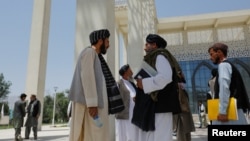In coming weeks, tens of thousands of students in Afghanistan are set to sit for university entrance examinations.
Notably absent from the list of candidates will be females.
The upcoming exams are expected to determine the admission of about 70,000 students to public academic and professional institutions this year.
Last week, when officials from the Taliban's Ministry of Higher Education unveiled the specifics of the upcoming exams, they conspicuously omitted any mention of the exclusion of female students from university admissions.
Despite facing widespread domestic and international criticism for their prohibition of women from educational and professional opportunities, the Taliban have persisted in enforcing discriminatory gender policies.
“The exclusion of women from higher education significantly limits the country's economic potential, as half the population is unable to contribute effectively to the workforce,” David Roof, a professor of educational studies at Ball State University, wrote to VOA.
In December 2022, the Taliban suspended nearly 100,000 female students enrolled in both public and private universities across Afghanistan.
With the nation already grappling with some of the most dire female literacy rates globally, Afghanistan has failed to produce any female professionals over the past two years.
According to aid agencies, the absence of female medical professionals, compounded by other restrictions, has contributed to the deaths of thousands of young mothers in Afghanistan.
The United Nations reports that over 2.5 million Afghan school-age girls are deprived of education.
“The interruption in education can result in a generational setback, where entire cohorts of women remain uneducated and unqualified for professional roles,” Roof said.
'Hermit kingdom'
The elusive supreme leader of the Taliban, Hibatullah Akhundzada, purportedly responsible for the ban on women's education and employment, has never publicly clarified his directive.
Initially, when secondary schools were shuttered for girls in March 2022, Taliban officials said the action was "temporary," insisting that the Islamist leadership did not fundamentally oppose women's education.
However, more than two years later, Taliban officials have provided no rationale for the continued absence of girls from classrooms.
“They have normalized gender-apartheid,” said an Afghan women’s rights activist who did not want to be named in this article, fearing the Taliban’s persecution.
“This is a new norm in Afghanistan, however insane and destructive it may look in the rest of the world,” she added.
In January 2022, the U.S. Department of State appointed Rina Amiri as the special envoy for Afghan women, aiming to garner international backing for Afghan women's rights.
Amiri has actively engaged with Muslim leaders, emphasizing the importance of women's rights in Islam, in hopes of influencing Taliban leaders.
Despite these efforts, there has been no indication from Taliban leaders of any intention to abandon their discriminatory policies against women. “There is no indication this will subside,” Amiri told a Congressional hearing in January.
Senior U.S. officials have also warned the Taliban that there will be no normalization in their relations with the international community unless they allow women to return to work and education.
Thus far, the Taliban’s response has been that they value depriving women of basic human rights more than having normal relations with the rest of the world.





